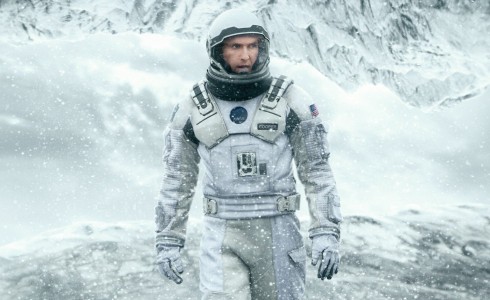Movie a Day Blog is fascinated by the frenzy that develops around certain highly-anticipated films as they are ready to be unleashed on a fervent group of fans. My students wanted me to cancel class so they could attend INTERSTELLAR (2014, Theatrical), an occurrence I’m sure took place on colleges across the country, not just film schools. (I said no.)
Is INTERSTELLAR worth all the hype? Decidedly yes, although as to whether it fulfills all of director/co-writer/co-producer Christopher Nolan’s grand ambitions, my answer would be decidedly no.
Nolan, who seems determined to be the dyspeptic successor to British epic filmmaker David Lean (LAWRENCE OF ARABIA, 1962, etc.) for the space-age set, has no less than the fate of humankind at the base of his story, and it’s not a pretty fate he has envisioned for us.
In the ultimate irony for the healthy food crowd, it’s only corn that survives as a crop to feed the 6 billion people on Earth, and its high fructose content is now limited by the growing dust storms of the near-future. Michael Caine, who’s getting a bit too comfortable in the role of scientific sage since he never appears believably scientific, has a Plan A and a Plan B for the Earth’s future, only one of which even tries to save our planet’s current population.
Still, old NASA astronaut Matthew McConaughey leaves behind a precocious daughter, a dutiful son who grows into Casey Affleck and a pushy Grandpa (John Lithgow, enjoying a career resuscitation) to head into space and towards a friendly wormhole that Caine and company believe was put there by an alien race trying be good neighbors and lend a helping hand.
To say much more would spoil the many pleasures of the narrative constructed by Nolan and his brother Jonathan, who wrote two of Christopher’s DARK KNIGHT films and the short story upon which Nolan’s breakthrough feature, MEMENTO (2000), was based. Their story takes almost three hours to unspool, and while the plot twists and turns are numerous and almost always effective, they tire after two-plus hours, and the film feels at least 20 minutes too long, particularly in the endless space journeys.
In all of his films, including those focusing on Bruce Wayne/Batman, Nolan has been obsessed with time: its capacity to store pain and anger; its manipulation by science, magic and dreams; its ability to motivate us and trick us.
INTERSTELLAR is like his master’s thesis on the subject, since this is the clearest explanation I’ve seen presented on film of Albert Einstein’s theory of relativity. When McConaughey, Anne Hathaway, and two other astronauts take off for a place far far away, their time also goes far away, and not just long, long ago. They know everyone on Earth will age faster than they will, but the reality of this theorem plays out in ways no one, including us in the audience, anticipates.
The film is beautifully mounted on every level of film craft; Nolan is, along with David Fincher, the top technical filmmaker of our Hollywood era, and he shows off all his tools and his ability to master them in shot after shot, breathtaking sequence following one after another. Space travel has never seemed so mundane, and INTERSTELLAR does not even attempt to compete with the jaw-dropping beauty of Alfonso Cuaron’s GRAVITY (2013, Movie a Day Blog 1/6/14). Its sights are on bigger game, closer to the territory Stanley Kubrick mined with the symbolic riches of 2001: A SPACE ODYSSEY (1968).
INTERSTELLAR is burdened by trying to tell two big stories simultaneously: the exploration for a world that can save the future of humanity, existing in a bunch of test tubes Caine and daughter Hathaway have prepared, and the frantic efforts on Earth by a dedicated few to save the current crop of people, who don’t seem to be doing much to save themselves.
At one point the cross-cutting between McConaughey’s now-adult driven daughter played by Jessica Chastain, and the increasingly dire prospects for McConaughey, Hathaway & Co., was maddening and irritating; it consistently yanked you out of one story just when it was becoming interesting again.
When it comes to Academy Award time, I predict INTERSTELLAR will compete for many of the technical Oscars: the cinematography by Hoyte Van Hoytema, the Dutch cameraman who also shot HER (2013, Movie a Day Blog 1/4/14) and THE FIGHTER (2010, Movie a Day Blog 12/16/10)), is top-notch, as is the production design by Nathan Crowley, and the work of the special effects and visual effects teams is stunning. But the score by Hans Zimmer frequently overwhelms any attempt at emotional intimacy, and it is only thanks to the casting of Ellen Burstyn and her magnificent performance as the elderly version of McConaughey’s daughter that the end of INTERSTELLAR works and successfully ties the movie together.
There will be great debates on which galactic epic is superior, INTERSTELLAR or GRAVITY, but really, it’s like comparing STAR WARS (1977) and 2001 just because they’re both set in outer space.
Nolan knows well how to employ the tools of modern epic fimmaking, but the question remains if he has the soul and the heart that Cuaron wore on his characters’ spacesuits’ sleeves. He does dark very well, but there is precious little real emotion in INTERSTELLAR until the final 15 minutes, after a long slog through space. To use a Nolan metaphor, it was about time.



Comments are closed